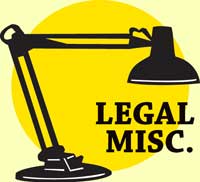Legal Issues Pertaining to Sweeping

Legal Issues Pertaining to Sweeping |
 |
Prevention of H1N1 (Swine Flu) in the WorkplaceThe following practical information and preventative steps are some of the things employers should consider related to H1N1, commonly known as swine flu. Note that these guidelines may also be applicable with other general workforce general health situations.
(Thanks to David Ross, of Millennium Maintenance and Power Sweeping, for the article tip.) 
Background Facts:According to the CDC, symptoms for swine flu are similar to the symptoms of seasonal flu in humans and may include some combination of the following: fever, greater than 100 degrees Fahrenheit, sore throat, cough, stuffy nose, chills, headache and body aches and/or fatigue. To prevent the spread of H1N1 flu, the CDC recommends avoiding contact with ill persons, covering your nose and mouth when you cough or sneeze, throwing used tissues in a trash can, and, after you cough or sneeze, washing your hands with soap and water, or using an alcohol-based hand gel. Thus far, most swine flu cases in the United States have been relatively mild. More current information about the disease and current statistics can be found at: http://www.pandemicflu.gov/ Proactive Steps:If an employee or visitor has actually been diagnosed with H1N1, or you have reason to believe that persons in your workplace have been exposed to persons who are infected, you should closely monitor the situation and be prepared to take the following steps should the need arise:
Privacy, Confidentiality and Non-Discrimination:Employers need to be mindful of their legal obligations with respect to privacy, confidentiality and non-discrimination. In many instances, employers can take protective measures without disclosing an individual employee's name or medical situation. Employers should also be alert to situations that could result in national origin discrimination, for example, discrimination against Mexicans. Finally, while employers can and should encourage open communication on workplace health and safety matters, they must be careful not to violate legal prohibitions with respect to disability-related inquiries and testing of employees and applicants.
The EEOC has issued a helpful guidance on ADA-compliant preparedness for H1N1: http://www.eeoc.gov/facts/h1n1_flu.html Preparedness:All employers are encouraged to adopt a detailed crisis control plan, so that your business can stay in operation in the event of pandemic influenza, severe weather, terrorist attack or other crisis that may limit the available workforce. Visit http://www.pandemicflu.gov/ for checklists and other helpful materials. Communication:Consider distributing a memorandum to all employees with information about H1N1 and steps they can take to protect themselves and promote a healthy workplace. Encourage employees to alert you if they, or someone close to them, is ill. Clarify policies, practices and procedures with respect to time off. Summary:Although the flu cases treated thus far in Massachusetts have been relatively mild, and the H1N1 Flu strain is not believed to pose a significant threat to healthy adults, employers should consider the above steps to reduce the potential impact of H1N1 on their business.
David B. Wilson: (617) 348-4314, dwilson@hrwlawyers.com Catherine E. Reuben: (617) 348-4316, creuben@hrwlawyers.com.
If you have questions or comments about this article, please let us know. |
© 2005 - 2022
|
Legal Issues Contents
|